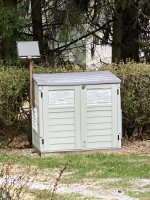Diggin It
Super Star Member
I do have 12V LEDs scattered through the house wired to a 35Va battery on a trickle charger, but that won't run the refrigerator, freezer, water heater or furnace.
The 2 hots or phases (call them L1 & L2) in a 120/240V panel aren稚 split onto the left and right side.
L1 will be first row of breakers #1 & #2
L2 will be second row of breaker #3 & #4
L1 will be third row of breakers #5 & #6
L2 will be forth row of breakers #7 & #8
etc...
That痴 why a double pole breaker that痴 on the left or right side of the panel can span poles 1&3, 3&5, 2&4, 4&6, 6&8, etc.. and get 240v from L1 & L2.
You want to balance the load between L1 & L2 , not left and right side of the panels.
Getting your various facilites back in operation is important. But having light really is the first priority. It's why I like a main transfer switch so even with a small generator, you have all your lighting. If I had the time, I would make 12 Volt lighting systems too.
The earliest wiring was done this way. It is called knob and tube. Knob-and-tube wiring - WikipediaThough not esthetic, I visited a cabin once that the owner had ran two uninsulated bare wires down the middle of all ceilings with insulated standoffs tied into a big deep cell battery outside connected to one fairly large solar panel. It was all off grid.
The ingenious part was that he had 12 volt light bulbs with sockets with a short length of wire pigtailed to each one for positive and ground. The other end was alligator clips. He could fasten that bulb(s) anywhere along the length he wanted and as many.
Poor mans track lighting.
The earliest wiring was done this way. It is called knob and tube. Knob-and-tube wiring - Wikipedia
I recently moved into a new house with the pictured breaker box and outside generator connection.
I'm interested in running only the fridge, gas stove, propane heat control and well pump, plus a couple of LED light bulbs.
I understand the switching at the breaker box, and will disconnect at the meter (just as a fail-safe). But I haven't purchase a generator yet and I'm looking for advice as to what type and capacity I need. View attachment 629096View attachment 629097
